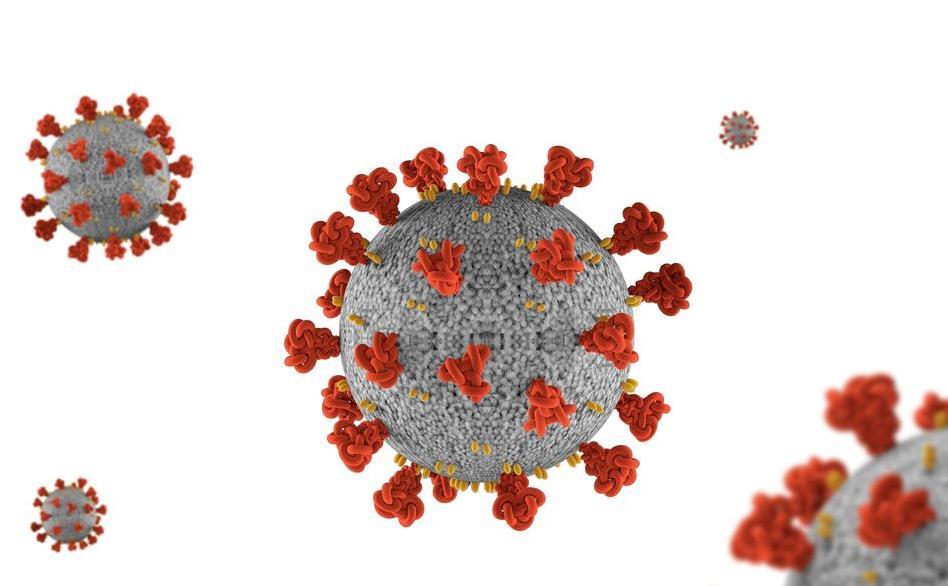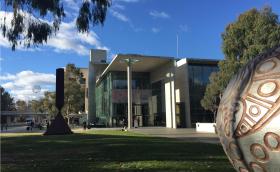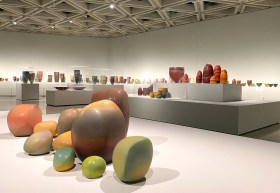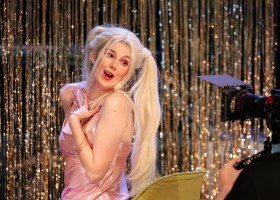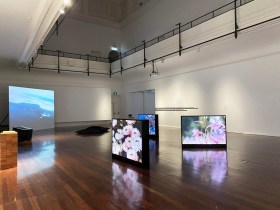The year started in smoke and flame, and ended with a flare-up of the Coronavirus in Sydney. In between came lockdowns, more lockdowns, mass cancellations of arts events across the country, and mass unemployment for many artists and casual and contract workers in the creative industries.
To be blunt: it’s been a shit of a year for many of us.
But there have been bright moments amidst the gloom, as well as some unexpected surprises. Here, we look back on the year that was, remembering and reflecting on events as they occurred, month by month.
JANUARY
With half the country seemingly wreathed in smoke, 2020 began on a sombre note. We rallied by writing an article called Six ways artists can take action on bushfires, offering up some practical ways the arts community could assist with bushfire relief – not knowing that soon we’d be the ones needing assistance. Then, Visual Arts Editor Gina Fairley followed up the topic by speaking with four institutions impacted by the fires, including the National Gallery of Australia and Bega Valley Regional Gallery.
On a happier note, January also saw the release of episode one of The ArtsHubbub, our new monthly podcast and also witnessed the cast and crew of American Psycho The Musical cleaning up at the Sydney Theatre Awards.
In Adelaide, the Arts Industry Council of South Australia released a landmark report documenting the economic impact and cultural reach of the state’s small to medium sector, while nationally, we celebrated as the likes of Wesley Enoch, Rachel Griffiths, Tim Minchin, Claire Spencer, Emma Webb and Rachael Maza were recognised in the 2020 Australia Day honours.
In Victoria, the month drew to a close with writers in many fields honoured at the 2020 Victorian Premier’s Literary Awards. The $100,000 Victorian Prize for Literature was awarded to the play Counting and Cracking by S. Shakthidharan and associate writer Eamon Flack; it also won the award for Drama. Other winners included Christos Tsiolkas (interviewed in our January podcast) who won the prize for fiction for his novel Damascus, and Christina Thompson, awarded the non-fiction prize for her book Sea People: The Puzzle of Polynesia.
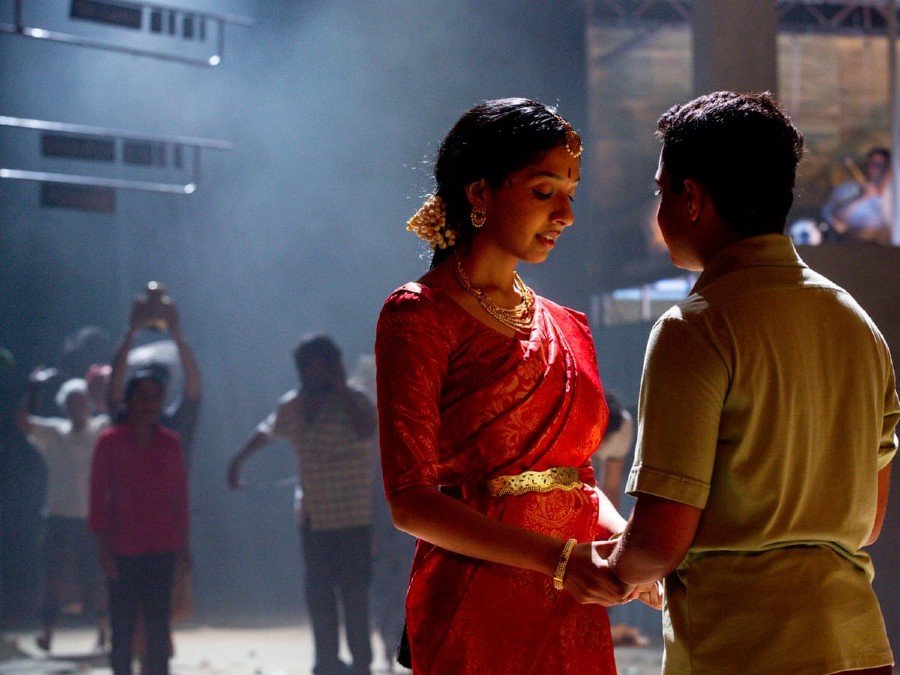
Counting and Cracking took home the $100,000 Victorian Prize for Literature in January. Photo credit: Brett Boardman.
FEBRUARY
With the climate crisis fresh in people’s minds due to the summer’s catastrophic fires, February began with a story about #BushfireBrandalism, a new example of art as protest – in this case, in response to the ‘business as usual’ approach taken by the Federal Government when it came to acting on climate change.
In Brisbane, Metro Arts prepared to farewell 40 years of history at its heritage-listed warehouse in the heart of Brisbane with a festival called Metro Arts – With Love while overseas, we were already seeing the first warning signs of what was to come when we reported on the Coronavirus-enforced closure of Art Basel Hong Kong on 7 February.
Closer to home, we wrote about the decision to merge Sydney-based Playwriting Australia and Hobart’s Australian Plays to create a new organisation, which PWA Chair David Berthold described as ‘a new entity that I believe will be greater than the sum of any two parts’.
Also in February, the National Library of Australia’s publishing arm – NLA Publishing – announced it would reduce the number of books it publishes each year from 17 to eight; the Artists’ Benevolent Fund was reinstated; and the Sydney Symphony Orchestra commissioned 50 Australian composers (from almost every state and territory, and half of them women) to a range of works over the next three years.
The month ended with Rick Heath, the new Executive Director of Black Swan State Theatre Company, rejecting conflict of interest concerns raised by ArtsHub regarding the relationship between the company’s Chair, Nicola Forrest, and its new principal sponsor Fortescue Metals Group, whose chairman and majority shareholder is Ms Forrest’s husband, the billionaire businessman Andrew ‘Twiggy’ Forrest.
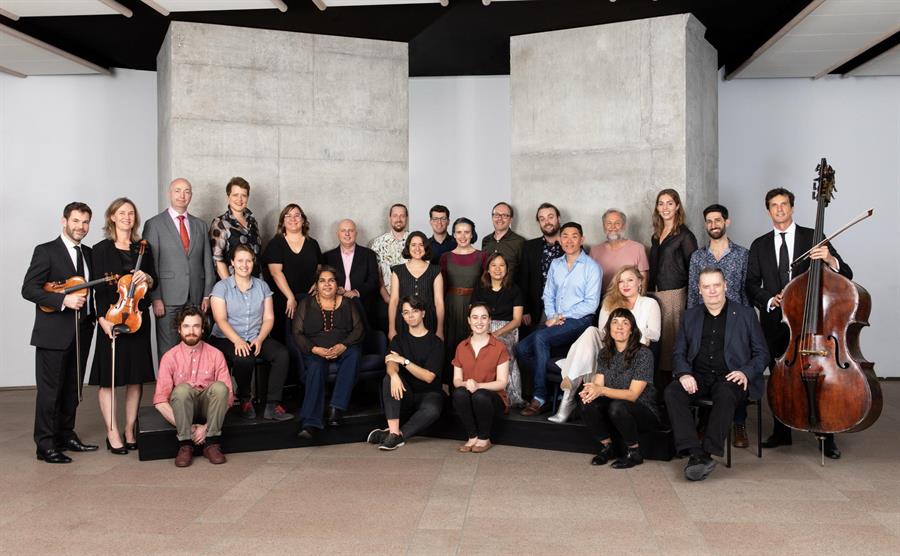
SSO CEO Emma Dunch, Director of Artistic Planning Raff Wilson, Concertmaster Andrew Haveron, Principal Double Bass Kees Boersma, and Tutti Viola Rosemary Curtin are joined by 21 of the 50 composers commissioned as part of 50 Fanfares. Photo: Jay Patel.
MARCH
March opened on an optimistic note, with the Australia Council and its delivery partner, the Australian, Film Television and Radio School, launching Future Form, a new professional development program. Bushfire-affected organisations in particular were urged to apply.
We asked Do we need another portrait prize? and celebrated the recipients of the 2020 Australia Council Awards, while in a sign of things to come, we explored the innovative ways some Hong Kong galleries, museums, and auction houses had pivoted online as they adapted to COVID-19.
Within a matter of days the reality of COVID began to hit home in Australia. Adelaide Festival had to replace a sick conductor at short notice, but things got serious on 11 March when Dark Mofo pulled the plug on its 2020 winter edition, with Leigh Carmichael, Dark Mofo’s Creative Director saying: ‘The financial exposure faced by David Walsh of a festival-wide last-minute cancellation would run into the millions, and likely end the event permanently. We’ve had to act decisively to ensure Dark Mofo’s long term survival.’
It wasn’t all bad news though, with the winners of the Sidney Myer Award performing arts awards announced the same day – including ArtsHub’s own Richard Watts, who was presented with the $25,000 Facilitator’s Prize.
On the afternoon of Friday 13 March, the Prime Minister announced that non-essential public gatherings of more than 500 people would be banned from the following Monday in order to limit the spread of the coronavirus. The impact on the arts sector was instantaneous, with Melbourne International Comedy Festival pulling the plug on its 2020 Festival that same night. Galleries, theatres and other large organisations across the country quickly followed suit. The dark days which would come to define 2020 had begun.
Much of March for the ArtsHub team was taken up by updating a list of cancelled and closed events, exhibitions and performances across the country; we eventually stopped updating the list (which was first published on 16 March) on the basis that the entire sector seemed to have ground to a halt by 25 March.
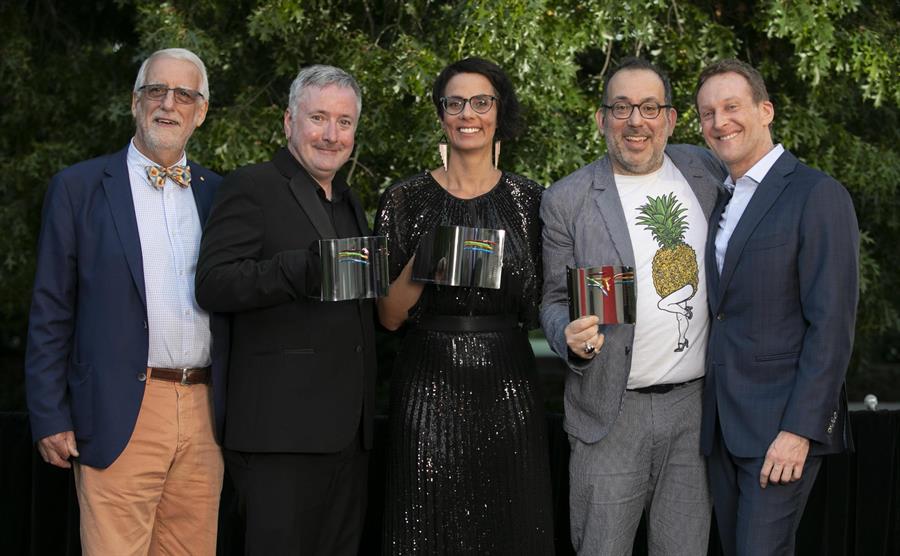
The Sidney Myer Performing Arts Awards were presented in March. L-R: Carrillo Gantner AC, Chairman, Sidney Myer Fund, Richard Watts, Claire Edwardes, Barrie Kosky and Leonard Vary, CEO, The Myer Foundation and Sidney Myer Fund. Photo credit: Fiona Hamilton.
The closure and cancellation of events across the country created tensions everywhere, perhaps most notably at Opera Australia, where the company’s orchestra protested outside Opera Australia’s Sydney head office over being stood down without pay. Opera Australia subsequently announced that orchestra members can ‘bring forward two weeks of their leave as there are no performances scheduled at which they can play in that period,’ according to CEO Rory Jeffes. The situation only emphasised how the already precarious gig economy had been rocked by the closures and cancellations associated with COVID-19.
Federal Minister for the Arts Paul Fletcher was gratifying quick to respond to the sector’s needs, hosting a round-table with arts leaders on 17 March to discuss the pandemic’s impact. The Queensland Government was also quick to respond, with Minister for the Arts Leeanne Enoch announcing an $8 million dollar relief package for the arts sector on 18 March – the first of many such announcements to come.
On Sunday 21 March the Federal Government announced changes to JobSeeker, including a new $550 per fortnight coronavirus supplement; a few days later South Australia and the ACT announced new measures to assist the sector, and Queensland rolled out a second round of support programs.
The Australia Council soon followed suit, redirecting $5 million in funds to support the sector, as did the City of Melbourne, which announced a $2 million support package for artists and creative organisations impacted by COVID-19.
The Federal Government was yet to act specifically to support the sector, prompting an open letter from more than 100 organisations imploring the Prime Minister to act swiftly in order to secure the future of Australia’s cultural life. The City of Sydney wasn’t dragging its heels, however, passing a $3.5 million support package – with the Tasmanian Government also pledging $2 million for its state’s cultural sector thereafter.
We offered some advice of our own, in an article called How you can help artists hit by COVID-19, while on 30 March, details of the JobKeeper program were announced, a godsend for employers hard-hit by the pandemic – though as we were soon to learn, too many artists fell between the cracks and did not benefit from JobKeeper; nor was the tertiary education sector eligible, a fact which would have devastating effects later in the year.
We ended the month by sharing a piece from the Arts Law Centre of Australia entitled What are your legal rights during COVID-19?, a practical guide for artists dealing with the fallout of COVID-19. We also published a cautionary story about the future of performing arts centres across the country – some of which were dealing with the double or triple whammy of drought, bushfires and now COVID-closures. ‘For a lot of venues that’s going to mean an indefinite shutdown, if not permanent – which is terrifying,’ warned Katherine Connor, the Executive Director of Performing Arts Connections Australia.
APRIL
April opened with the Emerging Writers’ Festival breaking new ground by taking its entire program online in response to COVID-19 – with other festivals around the country quickly following in the EWF’s footsteps.
In Launceston, Mudlark Theatre expressed fears for its future given the impact of the pandemic; a few days later the entire sector trembled as the outcomes of the Australia Council’s four-year funding program were announced. Only 95 organisations were successful in applying for four-year funding – down from 128 in 2016. The publishing sector was especially hard-hit, with literary magazines saying they were ‘radically overlooked’ by the Australia Council.
Within days, the Opposition and the Greens were condemning the Government’s failure to provide the Australia Council with extra funds during the pandemic, and peak bodies were calling for urgent financial investment in the sector to offset fallout from the four-year funding announcement.
On 9 March, the Federal Government announced $27 million in targeted relief funding for the arts (specifically targeting the Indigenous arts sector, regional arts and the charity Support Act). A few days later, JobKeeper amendments for casuals were voted down.
On 11 April, scandal-prone NSW Arts Minister Don Harwin resigned from cabinet after non-compliance with COVID-19 isolation rules (he would be reinstated in a few months’ time); later that month, Victoria’s Andrews Government demonstrated its support for the sector by launching a $16.8 million arts survival package targeting both individual artists and arts organisations.
NSW followed with a $6.34 million relief package for the state’s small-to-medium arts and screen sector; Theatre Network Australia announced a $1 million ‘crisis cash for artists’ fundraiser; and closing out the month, Sydney Writers’ Festival announced its all-digital edition for 2020.
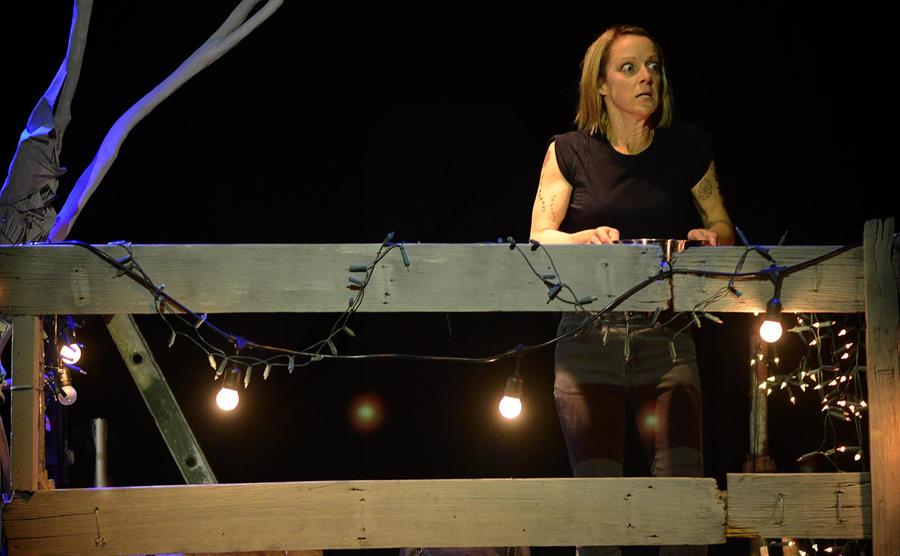
A scene from Mudlark Theatre’s Caravan Boat Treehouse. Mudlark expressed grave concerns about there future in April this year due to the impact of COVID-19. Photo credit: Scott Cunningham.
MAY
Australia was one of many nations whose arts and cultural sectors were devastated by COVID-19, and May opened with a virtual meeting of 130 Ministers of Culture from around the world, aimed at laying out recovery strategies for the post-COVID world.
On 5 May, we reeled at the news that COVID-19 had forced Carriageworks into administration; more positive news came a few days later with the Prime Minister announcing a three-step plan in easing COVID-19 restrictions for cultural venues, with libraries the first cab off the rank.
The runaway success of Queensland-born children’s entertainment icon Bluey continued with the news that Bluey: The Beach had won the Australian Book Industry Award’s Book of the Year – the first children’s picture book to win overall.
May also saw news of a new museum opening in Sydney dedicated to preserving Chinese history and culture in Australia; a global study conducted by Patternmakers (Sydney) and WolfBrown (USA) revealed that 9 in 10 arts audiences would return as pandemic fears ease; and the Support Act Wellbeing Helpline (a free, confidential service available 24 hours a day, seven days a week) expanded to include all artists and arts workers thanks to the support of the Federal Government.
In Melbourne, the city’s new winter festival revealed its name as RISING and announced a $2 million commissioning fund for Victorian artists to help alleviate the impact of COVID-19, while in NSW, the Berejiklian Government’s announcement of a $50 million relief fund for the sector was quickly overshadowed by pork-barreling claims.
Brighter news came on 26 May, with Federal Minister for the Arts Paul Fletcher announcing that Australia’s National Collecting Institutions would be able to re-open to the public starting 30 May, while on 27 May, Darwin’s Brown’s Mart Theatre announced its intentions to reopen early in June – making it the country’s first theatre to reopen post-COVID.
Finally, across the ditch, New Zealand launched a $175 million (AUD $163,483,753) arts support package – further entrenching our respect for Jacinda Ardern’s Prime Ministership.

Bluey: The Beach won the Australian Book Industry Award’s Book of the Year in May.
JUNE
In early June, Live Performance Australia announced its $345 million, two-year recovery plan to rebuild the live performance sector; the arts sector was largely overlooked in the 2020 Queen’s Birthday Honours list; Kalgoorlie-born actor Meyne Wyatt electrified audiences on Q & A with an extract from his play City of Gold; and a survey of the live music sector revealed that ‘the industry teeters on the brink of collapse’, with 42% of operators believing they will permanently close their doors if they did not receive government support.
On 16 June, Queensland announced a further $22.5 million for arts recovery, including a First Nations Commissioning fund and support for projects by independent artists and organisations. A few days later, the Federal Government announced that the cost of studying the humanities would soar by 113% in order to encourage [students] to ‘make more job-relevant choices’.
Also in June, two book critics resigned from their roles at Nine newspapers The Age and The Sydney Morning Herald in protest over a lack of diversity among a cohort of recently hired writers; the National Gallery of Australia announced redundancies as part of plans to shed 10% of all staff positions; Playwriting Australia announced its ‘Dear Australia’ project, featuring 50 playwrights exploring our new normal in a series of specially commissioned short monologues; and the Arts Industry Council of South Australia called on the Marshall Government to invest an additional $10 million to ensure the survival and recovery of the state’s arts and cultural sector.
Perhaps the biggest news in June was the Morrison Government’s long-awaited announcement of a $250M Arts and Entertainment Package to support the sector. In a statement, Prime Minister Scott Morrison said the package would help get the ‘show back on the road, to get their workers back in jobs.’ The package was welcomed, though also criticised for not providing enough for the sector’s needs.
An additional funding announcement, concerning an $8 million boost to the National Library of Australia (NLA) over the next two years to support the ongoing development of Australia’s digital heritage portal, Trove, was also welcomed.
Rounding out the month, a new independent report released on 24 June found that Australia’s largest orchestras and other major classical music organisations played more pieces with the word ‘violin’ in their titles in 2019 than works by female composers. The report also revealed that only 9% of 2,006 works performed in 2019 by the nation’s major orchestras were written by Australian composers.
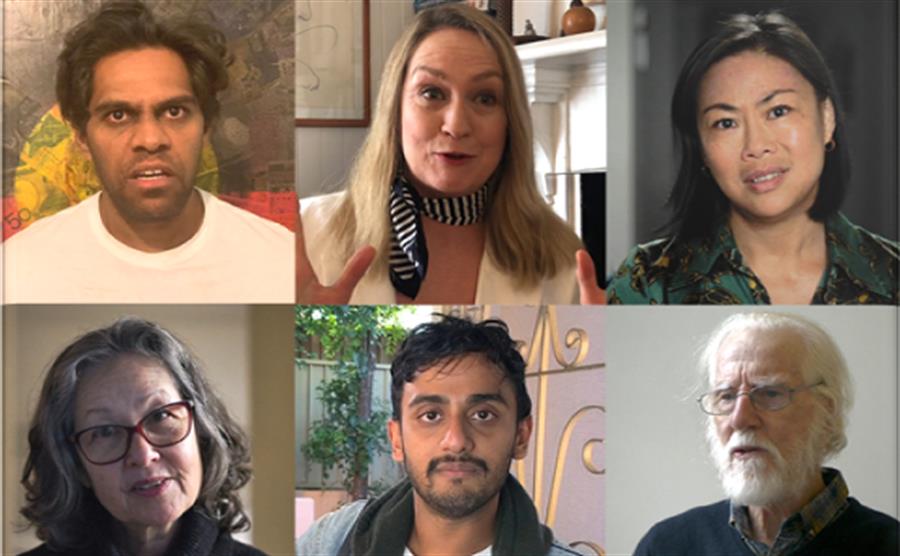
Some of the performers participating in Playwriting Australia’s Dear Australia. Image supplied.
JULY
A $90 million cultural precinct for Launceston was announced on 1 July, with the sector also welcoming news of Diversity Arts Australia’s anti-racism initiative, the Creative Equity Toolkit (created in partnership with the British Council in Australia).
On 3 July the Australia Council announced the return of a number of funding programs for individual and organisations that had previously been suspended in order to deliver the Resilience Fund.
With evidence tendered at the Senate Inquiry into the impact of COVID-19 suggesting that money from the Federal Government’s $250 million relief package for the arts would not be available to the sector until at least September, the Opposition went on the attack, while in NSW, the Berejiklian Government performed a surprise backflip on the contentious sale of the Powerhouse Museum’s Ultimo site.
In Victoria, the Andrews Government announced a $15 million program to support the state’s live music sector recover from COVID shutdowns; that same week, the sector reeled as Melbourne went back into lockdown following a spike in Coronavirus infections. The second lockdown would last for 112 days in total, taking a heavy toll on Melburnians generally.
In brighter news, Playwriting Australia announced $370,000 to create new post-pandemic works, ensuring that scripts would be ready for production when theatres reopened; the Chamber of Arts and Culture Western Australia released its Arts and Culture Economic Recovery Plan in response to the WA Government’s Recovery Planning Framework; a new industry body was formed to support ‘behind the scenes’ music industry personnel including roadies, sound techs and band bookers; Canberra Writers Festival came under attack for its program’s lack of diversity; and Wiradjuri author Tara June Winch won the 2020 Miles Franklin award for her novel The Yield.
In South Australia, the theatre sector slowly returned to business as usual, spearheaded by Slingsby’s The Tragical Life of Cheeseboy, while across the country, the Audience Outlook Monitor showed that 1 in 4 audience members had already returned to cultural events and venues.
After grim news in May, Carriageworks announced it had secured an independent future in July thanks to a 20-year lease agreement and guaranteed annual funding – two necessities it had struggled to achieve since opening in 2007.
We also looked at the latest changes to JobKeeper and what they meant for the sector; detailed the decision by AMPAG (the Australian Major Performing Arts Group) to close its doors after 21 years; examined the decision of literary organisation The Lifted Brow to appoint an interim Board to ‘prevent the organisation from immediately dissolving’; and documented the fury of numerous NSW arts organisations over the fact that an already-delayed funding round’s outcomes were communicated to them by the media, or by texts from colleagues, instead of by Create NSW officials.
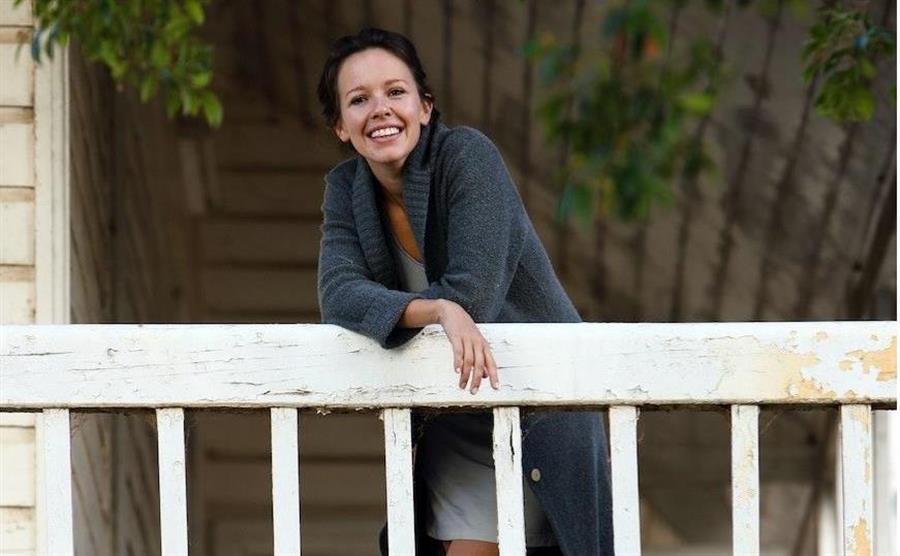
Miles Frankllin Award-winning author Tara June Winch at Booranga Writers’ Retreat near Wagga Wagga. Image by Bryan Charlton.
AUGUST
Flipside Circus announced plans for a uniquely designed new home in Brisbane in 2021, which would support community and social circus training while also being accessible to the broader circus sector; award winning writer and Kurdish-Iranian asylum seeker Behrouz Boochani was granted refugee status in New Zealand after languishing in detention on Manus Island for six years; the West Australian government announced a $76 million arts and culture recovery package, including a $15 million ‘Getting the Show back on the Road’ plan for the performing arts; and the Federal Government released guidelines for the $75 million RISE fund (with the first round of recipients announced incrementally later in the year, starting in November).
August also saw the first round of the Federal Government’s $20 million Live Music fund open, and rebuilding start at Melbourne’s iconic La Mama Theatre following the devastating fire of 2018.
A report commissioned by the Australia Council for the Arts showed the need to challenge narrow perceptions of what constitutes First Nations theatre and dance; Darwin Festival staged its homegrown edition, sharing learnings about pandemic operations with the sector; the Federal Government announced its Creative Economy Taskforce, whose 12 members are providing strategic guidance around restarting the creative economy; MEAA announced it would be working with Opera Australia to ensure redundancies at the company are ‘justified’; while in Sydney, Belvoir and the STC announced plans to bring live theatre back to the mainstage.
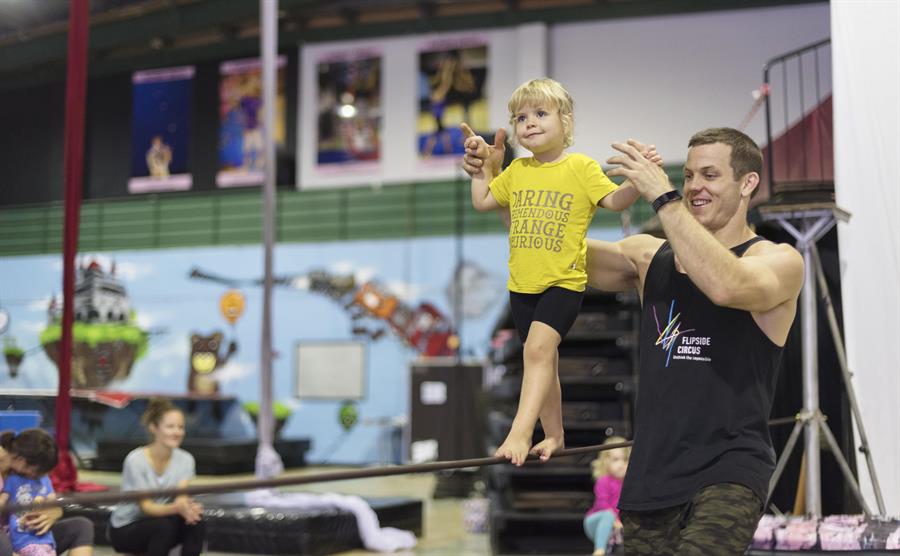
Training in progress at Flipside Circus, who announced plans for a new circus centre in August, due to open in 2021. Image supplied.
SEPTEMBER
The start of September saw Metro Arts open its fit-for-purpose new home in Brisbane’s West End; the Federal Government asked for feedback on its plans for an Indigenous Visual Arts Action Plan; and tensions intensified between Opera Australia and MEAA over redundancy plans at the national opera company.
In Victoria, a report conducted by Ausdance Victoria found that 90% of dance studios risked closure as the pandemic ground on; Brisbane’s performing arts sector fought back with plans for a new bayside Fringe Festival, the return of Queensland Cabaret Festival and renewed activity on the mainstage; we predicted who would win the Archibald, Wynne and Sulman Prizes; and the Victorian Government announced its latest COVID-relief programs, this time with $13.2 million supporting the live music sector, including venues and venue staff as well as musicians.
Also in October, the musical theatre development prize, the Rob Guest Endowment, was cancelled until 2022 due to a lack of diversity among the semi-finalists; a new survey showed that Australian University Art Museums punch well above their weight; new programs demonstrated the value of art and music for people living with dementia; Vincent Namatjira won the Archibald Prize, the first time the prestigious portrait prize has been awarded to a First Nations artist in its 99 year history; and South Australia celebrated the Marshall Government’s investment of $10.2 million to help the state’s arts industry recover from the impact of COVID-19.
As the month dragged on, the Opposition condemned the fact that the Federal Government’s $250 million arts bailout package had still not reached a desperate sector despite being announced back in June,
Elsewhere, WAAPA announced it would relocate to a new, high-tech campus in Perth’s CBD; the NSW live music industry said it was close to collapse; and the impacts of the Federal Government’s failure to support the tertiary education began to be felt, with Monash University announcing plans to axe the renowned Centre for Theatre and Performance, with the ethnomusicology and musicology course specialisms in the Faculty of Arts also being targeted. Theatre courses and fine arts programs at other universities would soon follow suit.
On a brighter note, as September drew to a close, the NSW theatre sector was celebrating the news that audiences could be increased to 50% capacity, making the staging of work more viable.
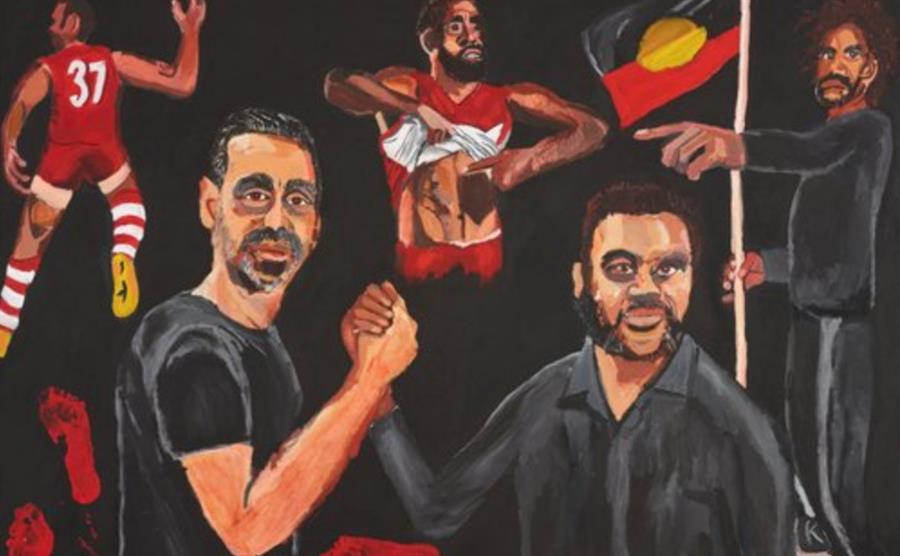
Detail, Vincent Namatjira’s winning painting of footballer Adam Goodes, 2020 Archibald Prize winner.
OCTOBER
The month began with the Australia Council releasing new protocols addressing key legal, ethical and moral considerations for the use of Indigenous cultural material in the arts, while in Queensland, Minister for the Arts Leeanne Enoch launched an ambitious 10-year arts roadmap aimed at renewing and transforming the state – socially, culturally and economically – through arts, culture and creativity.
In Victoria, following Martin Foley’s promotion to the health portfolio, Danny Pearson MP took over as Minister for Creative Industries, saying ‘The creative sector has been hit hard by the coronavirus pandemic and I will work to support local creatives and advocate for them as we go through this challenging period.’
The National Gallery of Victoria announced plans for Queer, a landmark exhibition opening in December 2021 that promises to explore the NGV Collection through a queer lens; and Melbourne’s Hellenic Museum announced ambitious plans for the first international satellite of the Benaki Museum.
Responding to the lack of diversity in theatre and musical theatre, the Artists of Colour Initiative announced its 30 semi-finalists in October, and the Australia Council for the Arts rescinded a $25,000 grant for performance artist Casey Jenkins’ artwork IMMACULATE, in what was described as an ‘extraordinary intervention’ that shocked the experimental arts sector. Over the course of the year the Institute of Public Affairs’ Dr Bella d’Abrera and various Murdoch platforms published a number of pieces attacking artists including Jenkins and others, arts funding generally, and the Australia Council.
On a brighter note, October also saw the inaugural Perth International Cabaret Festival announced for June 2021; and arts think tank A New Approach announced its plans to become independent from the Australian Academy of the Humanities.

Queensland’s Minister for the Arts Leeanne Enoch MP launched the state’s decade-long arts plan in October with sector colleagues Kris Stewart, Artistic Director, Brisbane Powerhouse; Joel Edmondson, CEO, Queensland Music Festival; and Kerry Saul, General Manager, Empire Theatres. Image: Facebook.
NOVEMBER
The National Art School announced plans for a new National Drawing Centre; the gloriously diverse Australian cast of blockbuster musical Hamilton was revealed; NSW announced stage two of its Rescue and Restart package, comprising $30 million focused on Create NSW multi-year and annually funded organisations; and the Andrews Government announced a further $17.2 million package to reactivate Victoria’s arts sector, including a $7.9 million package designed to assist Victoria’s public cultural institutions in staging outdoors experiences (taking the state’s total COVID-support expenditure to more than $107 million).
Elsewhere, three new and expanded museums opened around the country: the new WA Museum, the Chau Chak Wing Museum, and major refurbishments to the Australia Museum; the South Australian state budget for 2020-2021 featured significant arts investment, including $50M towards Adelaide’s Aboriginal Art and Cultures Centre; and the ACT welcomed a new Arts Minister following the October election.
November also saw South Australia briefly locked down following a COVID scare; the NSW budget included a $291 million boost for arts and culture in its 2020-2021 budget; Victoria introduced a new initiative paying artists to work in schools for six months; and plans for a new National Centre for Photography were announced for the regional Victorian city of Ballarat.
In Queensland, cuts to photography, design and fine arts at Queensland College of Art were described as ‘A Roadmap to Death of the Arts and Artists’; while arts organisations nationally expressed concern over the way RISE funding was announced, with many left in the dark as to whether they’d been successful or not.
Victoria released its 2020-2021 state budget, including $1.46 billion for the transformation of the Southbank Arts Precinct; and NSW’s interdisciplinary space for the production and presentation of contemporary art, Artspace, received over $5 million for a makeover.
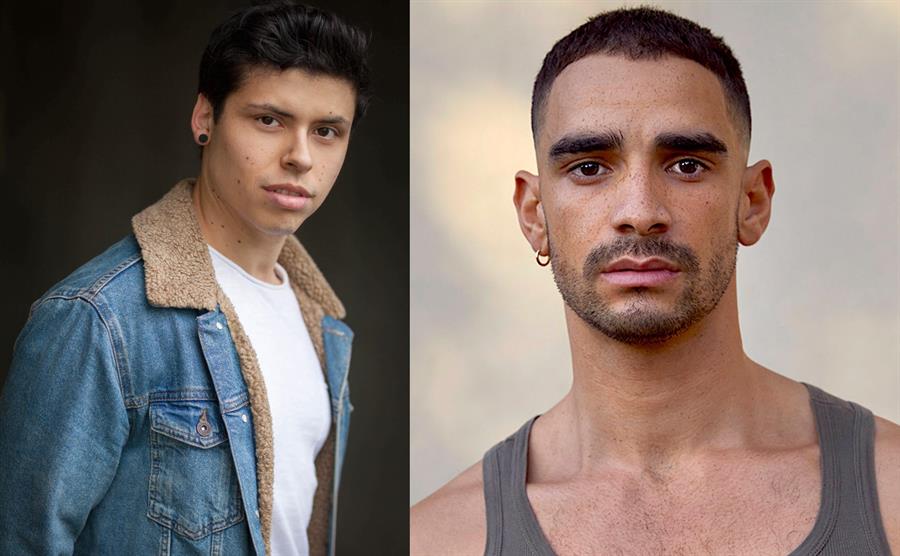
Hamilton cast members Jason Arrow (left) and Lyndon Watts (right). Images supplied.
DECEMBER
As we stagger collectively towards the finishing line of a truly exhausting 2020, the last few weeks of have seen the winners of the 2020 National Arts and Disability Awards announced; details of the Federal Government’s arts industry loans scheme announced following an agreement between the Morrison Government and two major banks; and the winners of the 2020 Prime Minister’s Literary Awards announced, with Tara June Winch honoured for her novel The Yield, which also won the 2020 Miles Franklin award back in July.
Into the home stretch and the National Art School received over $18 million from the NSW government for critical maintenance of its 200-year old building’s stonework; more RISE funding was announced, allocated to organisations in Tasmania and Queensland, and South Australia and the NT; and a new group was formed to help strengthen performing arts touring across the nation.
The Small Press Network announced its 2020 Book of the Year Award, with Tasmanian author Pete Hay’s Forgotten Corners: Essays in Search of an Island’s Soul taking home the prize; and finally, the National Gallery of Victoria received a $20 million grant from the Ian Potter Foundation towards its new contemporary gallery. The gift is the single largest grant ever made by The Ian Potter Foundation in its 56 years of operation.
And that’s it. 2020 is as good as done and dusted. Time to fall over now.

